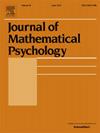关于学习空间的评论
IF 2.2
4区 心理学
Q2 MATHEMATICS, INTERDISCIPLINARY APPLICATIONS
引用次数: 0
摘要
本文在 Eppstein 等人(2008 年)的意义上讨论了学习空间,以说明(1) 学习空间不一定要有基底;(2) 本质上有限的学习空间不一定要有良好的分级;(3) 封闭有根媒介的正向内容族不一定是知识结构,因此也不一定是学习空间。这些结果推翻了 Eppstein 等人(2008)的三个论断。本文章由计算机程序翻译,如有差异,请以英文原文为准。
Remarks on learning spaces
This paper discusses learning spaces in the sense of Eppstein et al. (2008) to show that: (1) a learning space need not to have a base; (2) an essentially finite learning space need not to be well-graded; (3) the positive content family of a closed rooted medium need not to be a knowledge structure, and so it need not to be a learning space. These results disprove three assertions in Eppstein et al. (2008).
求助全文
通过发布文献求助,成功后即可免费获取论文全文。
去求助
来源期刊

Journal of Mathematical Psychology
医学-数学跨学科应用
CiteScore
3.70
自引率
11.10%
发文量
37
审稿时长
20.2 weeks
期刊介绍:
The Journal of Mathematical Psychology includes articles, monographs and reviews, notes and commentaries, and book reviews in all areas of mathematical psychology. Empirical and theoretical contributions are equally welcome.
Areas of special interest include, but are not limited to, fundamental measurement and psychological process models, such as those based upon neural network or information processing concepts. A partial listing of substantive areas covered include sensation and perception, psychophysics, learning and memory, problem solving, judgment and decision-making, and motivation.
The Journal of Mathematical Psychology is affiliated with the Society for Mathematical Psychology.
Research Areas include:
• Models for sensation and perception, learning, memory and thinking
• Fundamental measurement and scaling
• Decision making
• Neural modeling and networks
• Psychophysics and signal detection
• Neuropsychological theories
• Psycholinguistics
• Motivational dynamics
• Animal behavior
• Psychometric theory
 求助内容:
求助内容: 应助结果提醒方式:
应助结果提醒方式:


